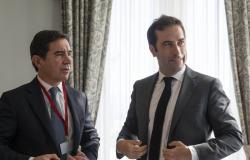During the first day of the XIV International Congress of Prospectors and Explorers (Proexplo 2025), outstanding international panelists agreed that Peru has the potential to lead the formation of the next generation of geologists, provided that it strengthens practical teaching, field work and analytical thinking. The round table “training the explorers of the future: global perspectives in education in geology”, moderated by Lisard Torró, a member of the Organizing Committee, stressed the strategic opportunity of the country to become a global core of geosciences.
“Peru has an extraordinary geological wealth, but the real capital is in the minds that include it,” said Torró, highlighting the need to form explorers capable of leading the future of the mining industry. Silvia Rosas, Past President of Proexplo and founder of the Geological Engineering career in the PUCP, emphasized the importance of having teachers with active training and access to real field experiences to promote teamwork and consolidate the university structure.
Strategic skills and opportunities
-Experts such as Richard Sillitoe, with five decades of experience, and Federico Cernuschi, a geochemistry specialist, alerted about the global setback in essential competences such as mineralogical recognition, mapping and spatial thinking. “Software domain does not replace deep geological understanding,” said Sillitoe. For his part, Cernuschi stressed that South America, and in particular Peru, could capitalize on this global lack by strengthening field schools and mapping programs as key training tools.
*OPPORTUNITY TO THE GLOBAL METAL DEMAND
Regina Baumgartner, a geo -scientific with exploration experience, said a worrying contradiction: while the demand for metals for the energy transition grows, many universities of the northern hemisphere are eliminating mining deposits programs. “This opens a unique window for Peru, which can export not only minerals, but also highly trained professionals,” he said. Baumgartner highlighted human talent






